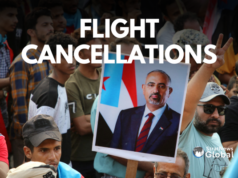Millions of voters in South Korea flocked to the polls on Tuesday in a snap presidential election, with millions aiming to restore stability after six months of turmoil triggered by former leader Yoon Suk Yeol’s brief martial law.
The new president will face the challenge of rallying a society deeply scarred by the attempt at military rule and an export-heavy economy reeling from unpredictable protectionist moves by the United States, a major trading partner and a security ally.
After being impeached by parliament in December, Yoon was removed from office by the Constitutional Court on April 4, less than three years into his five-year term, triggering the snap election that stands to remake South Korea’s political leadership and foreign policies.
High Turnout
As of 3 p.m., 30.5 million people, or nearly 69% of the electorate, had voted at 14,295 locations, according to the National Election Commission, with car dealerships, gyms and fields for traditional Korean wrestling known as ssireum turned into polling stations.
“I hope the issues surrounding martial law are addressed more clearly and transparently,” said 40-year-old Seoul resident Kim Yong-Hyun. “There are still many things that don’t make sense, and I’d like to see them properly resolved.”
Turnout was running slightly ahead of the 2022 presidential vote at the same time, with polls set to remain open until 8 p.m. (1100 GMT) and following early voting when more than a third of the 44.39 million eligible voters cast their ballots.
“Only six golden hours are left to save South Korea, which is in crisis due to the greed of the establishment,” liberal frontrunner Lee Jae-myung said as he urged people to vote in a Facebook post.
Both Lee and his conservative rival Kim Moon-soo have pledged change for the country, saying the political system and economic model set up during its rise as a budding democracy and industrial power are no longer fit for purpose.
Their proposals for investment in innovation and technology often overlap, but Lee advocates more equity and help for mid-to-low-income families, while Kim has campaigned on giving businesses more freedom from regulations and labour strife.
Overshadowing any social policy initiatives, however, is Yoon’s brief attempt to impose martial law that has loomed large over the poll.
‘Judgement Day’
Lee has called the election “judgment day” against Kim and his People Power Party, accusing them of having condoned the martial law attempt by not fighting harder to thwart it and even trying to save Yoon’s presidency.
Kim was Yoon’s labour minister when the former president declared martial law on December 3.
Kim has branded Lee a “dictator” and his Democratic Party a “monster,” warning if the former human rights lawyer becomes president, nothing will stop them from working together to amend laws simply because they do not like them.
“I and the People Power Party will do our best to save people’s livelihoods and the economy,” Kim said in a Facebook post.
‘Polarised’
The frontrunner, Lee and his rival Kim, cast their ballots during early voting last week. Yoon and his wife voted at a school near their private residence on Tuesday, appearing relaxed but ignoring questions as they left the polling station.
Regular voters in Seoul urged the next leader to ease discord, restore stability and address urgent challenges from the fallout of the crisis that has touched their families.
“The economy has gotten so much worse since December 3, not just for me, but I hear that from everybody,” Kim Kwang-ma, 81, said. “And we as a people have become so polarised… I wish we could come together so that Korea can develop again.”
There were no female candidates running in Tuesday’s election for the first time in 18 years.
Despite polls showing wide gaps between young men and women, gender equality was not among the key policy issues put forward during this election, a stark contrast from the 2022 vote.
“One thing I am a bit frustrated about with mainstream candidates, whether Lee Jae-myung or other conservative candidates, is that they lack policy on women or minority groups,” said Kwon Seo-hyun, 18, a university freshman and first-time voter who went out to the streets for anti-Yoon protests following his martial law.
Lee is favoured to win, according to polls released a week before the vote, leading Kim by 14 percentage points with 49% public support in a Gallup Korea survey, although Kim had narrowed an even wider gap at the start of the campaign on May 12.
Exit Polls Shortly
Exit polls conducted by three television networks will be released at the close of the polls at 8 p.m. Ballots will be sorted and counted by machine first, then triple-checked by election officials by hand to verify accuracy.
It was not clear when the result would emerge. In 2022, Lee conceded to Yoon at around 3 a.m. the day after the vote in the closest presidential race in the country’s history, which was decided by a margin of less than 1 percentage point.
The National Election Commission is scheduled to certify the result on Wednesday, and the winner’s inauguration is expected within hours. There will be no presidential transition as the office has remained vacant since Yoon was removed.
(With inputs from Reuters)





